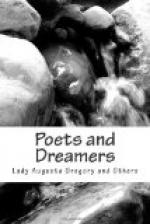Raftery’s satires, as I have heard them repeated by the country people, do not seem, even in their rhymed original—he only composed in Irish—to have the ‘sharp spur’ of some of his predecessors, such as O’Higinn, whose tongue was cut out by men from Sligo, who had suffered from it, or O’Daly, who criticised the poverty of the Irish chiefs in the sixteenth century until the servant of one of them stuck a knife into his throat. Yet they were much dreaded. ’He was very sharp with anyone that didn’t please him,’ I have been told; ’and no one would like to be put in his songs.’ And though it is said of his songs in praise of his friends that ‘whoever he praised was well praised,’ it was thought safer that one’s own name should not appear in them. The man at whose house he died said to me: ’He used often to come and stop with us, but he never made a verse about us; my father wouldn’t have liked that. Someway it doesn’t bring luck.’ And another man says: ’My father often told me about Raftery. He was someway gifted, and people were afraid of him. I was often told by men that gave him a lift in their car when they overtook him now and again, that if he asked their name, they wouldn’t give it, for fear he might put it in a song.’ And another man says: ’There was a friend of my father’s was driving his car on the road one day, and he saw Raftery, but he didn’t let on to see him. But when he was passing, Raftery said: “There was never a soldier marching but would get his billet. But the rabbit has an enemy in the ferret;” so then the man said in a hurry, “Oh, Mr. Raftery, I never knew it was you: won’t you get up and take a seat in the car?"’ A girl in whose praise he had made a song, Mary Hynes, of Ballylee, died young, and had a troubled life; and one of her neighbours says of her: ’No one that has a song made about them will ever live long;’ and another says: ’She got a great tossing up and down; and at last she died in the middle of a bog.’ They tell, too, of a bush that he once took shelter under from the rain, and how he ’praised it first; and then when it let the rain down, he dispraised it, and it withered up, and never put out leaf or branch after.’ I have seen his poem on the bush in a manuscript book, carefully written in the beautiful Irish character, and the great treasure of a stonecutter’s cottage. This is the form of the curse: ’I pronounce ugliness upon you. That bloom or leaf may never grow on you, but the flame of the mountain fires and of bonfires be upon you. That you may get your punishment from Oscar’s flail, to hack and to bruise you with the big sledge of a forge.’




